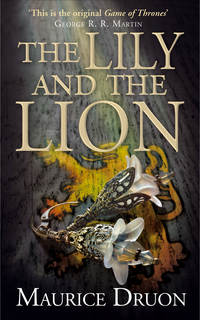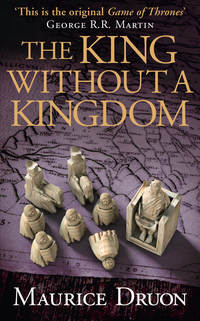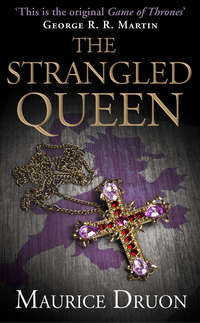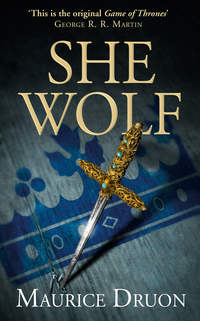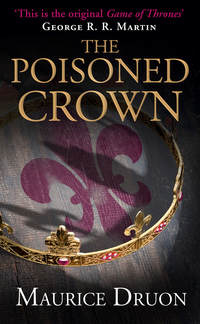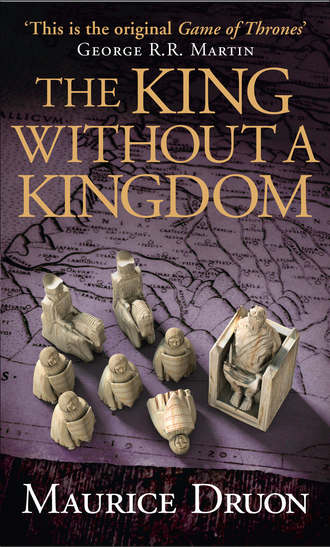
Полная версия
The King Without a Kingdom
I know there are some who scoff at my grand purple palanquin, its golden pommels and studs, and my horses upholstered with purple, and the two hundred lances of my escort, and my three lions of Périgord embroidered on my standard and on my sergeants’ livery. In this I travel at present. Because of all the noble display, when I enter a town, the people rush up to bow down before me, they come to kiss my mantle. I even make kings kneel (for Thy glory, Lord, for Thy glory).
However, these qualities of leadership were simply not in the air we breathed at the last conclave, and I was made well aware of it. They wanted a man of the people; they wanted a simple soul, a humble being, a plain one. I was barely able to prevent their electing Jean Birel, a holy man – oh! most certainly, a holy man – but who hasn’t an ounce of a mind suited for government and who would have been another Pietro da Morrone. I had eloquence sufficient to persuade my fellow conclavists how perilous it would be, given the state Europe found itself in, to elect another Celestine V. Ah! I certainly didn’t spare the poor Birel! I spoke so highly of him, demonstrating how his admirable virtues made him unsuited to governing the Church, that he was crushed, and remained so. And I managed to have Étienne Aubert proclaimed Pope, he who was born to poverty, not far from Pompadour, and whose career lacked the lustre that would have spontaneously brought everyone around to his cause.
We are assured that the Holy Spirit lights the way for us to designate the best amongst us; in fact, more often than not we vote to keep out the worst.
Our Holy Father disappoints me. He moans and groans, he hesitates, he makes a decision, he takes it back. Ah! I would run the Church very differently! And furthermore, it was his idea to send the Cardinal Capocci with me, as if it were necessary to have two legates, as if I weren’t knowledgeable and experienced enough to get things done on my own! And with what result? We fell out from the start, because I showed him the foolishness of his ways; he played the injured party, my Capocci; he withdrew; and while I race everywhere from Breteuil to Montbazon, from Montbazon to Poitiers, from Poitiers to Bordeaux, from Bordeaux to Périgueux, he merely writes everywhere, letters from Paris that undermine my negotiations. Ah! I sincerely hope I won’t come across him in Metz before the emperor.
Périgueux, my Périgord. My God, was I seeing them for the last time?
My mother always assumed I would be pope. She made it clear to me on more than one occasion. It was why she made me wear the tonsure from the age of six, and arranged with Clement V, who was most fond of her, that I be enrolled as a papal scholar, and thus become apt to receive benefices. How old was I when she took me to him? ‘Lady Brunissande, may your son, whom we most specially bless, display in the place you have chosen for him those very virtues that we should expect from such noble lineage as his, and quickly rise to the highest offices of our Holy Church.’ No, no more than seven years old. He made me Canon of Saint-Front; my first cappa magna. Almost fifty years ago now … My mother saw me as pope. Was it a dream of maternal ambition, or a prophetic vision as women sometimes have? Alas! I do believe that I shall never be pope.
And yet, and yet, in my birth chart Jupiter is closely tied to the Sun, a beautiful culmination, the sign of domination and of a peaceful reign. No other cardinal has such favourable aspects as I. My configuration was a great deal better than Innocent’s on the day of his election. But there you have it, a peacetime reign, a reign in peace; and yet we are at war, amidst turmoil and storm. My stars are too perfect for the times we are living in. Those of Innocent – which speak of difficulties, errors, setbacks – are better suited to this sombre period. God matches men and moments in the world, and calls up popes who correspond to His grand design, such a man for greatness and glory, another for shadows and downfall.
If I hadn’t entered the Church, as my mother wished, I would be Count of Périgord, since my elder brother died without issue, the very same year as my first conclave, and the crown I couldn’t take on was assumed by my younger brother, Roger-Bernard. Neither pope nor count. Oh well, one has to accept the place where Providence puts us, and try to do the best one can there. I will most probably be one of those men, those leading figures who play a great role in their century, but are forgotten as soon as they die. People have short memories; they remember only the names of kings (Thy will be done, Lord, Thy will be done).
Then again, there is no point in mulling over the same things I have already been through a hundred times. It was seeing the Périgueux of my childhood, and my beloved collegiate Saint-Front, and having to leave them once more, that shook my soul. Let us look rather at this landscape that I am seeing perhaps for the last time. (Thank you, Lord, for granting me this joy.)
But why am I being carried at such breakneck speed? We have already passed Château-l’Évêque; from here to Bourdeilles will take no more than two hours. The day one sets off, one should always break the journey as soon as one can. The goodbyes are trying, the last-minute petitions, the clamour for final benedictions, the forgotten piece of luggage: one never leaves at the allotted time. But this stage of the journey is indeed brief.
Brunet! Hey! Brunet, my friend; go ahead and order that they ease the pace. Who is leading us in such haste? Is it Cunhac or La Rue? It is really unnecessary to shake my bones so. And then go and tell Monseigneur Archambaud, my nephew, to dismount. I invite him to share my palanquin. Thank you, go.
For the journey from Avignon I had my nephew Robert de Durazzo with me; he was a most agreeable travelling companion. He had the features of my sister Agnes, as well as those of our mother. Why on earth did he want to get himself slain by a gang of English louts at Poitiers, waging the wars of the King of France! Oh! I don’t disapprove of his fighting, even if I had to pretend to. Who would have thought that King John would be trounced in such fashion! He lined up thirty thousand men against six thousand, and that very evening was taken prisoner. Ah! The ridiculous prince, the simpleton! When he could have seized victory without ever engaging battle! If only he had accepted the treaty that I bore him as if on a platter of offerings!
Archambaud seems neither as quick-witted nor as brilliant as Robert. He hasn’t seen Italy, which frees up youth no end. Most likely it is he who will finally become Count of Périgord, God willing. It will broaden this young man’s mind to travel in my company. He has everything to learn from me. Once my orisons are said, I dislike being alone.
2
The Cardinal of Périgord speaks

IT IS NOT THAT I am loath to ride on horseback, Archambaud, nor that old age has made me incapable of doing so. Believe me, I am fully able to cover fifteen leagues on my mount, and I know a fair few younger than I that I would leave far behind. Moreover, as you can see, I always have a palfrey following me, harnessed and saddled in case I should feel the desire or need to mount it. But I have come to realize that a full day cantering in the saddle whets the appetite but not the mind, and leads to heavy eating and drinking rather than clear thinking, of the sort I often need to engage in when I have to inspect, rule or negotiate from the moment I arrive.
Many kings, first and foremost the King of France, would run their states more profitably if they wore their backs out less and exercised their brains for a change, and if they didn’t insist on conducting their most important affairs over dinner, at the end of a long journey or after the hunt. Take note that one doesn’t travel any slower in a palanquin, as I do, if one has good wadding in the stretcher, and the forethought to change it often. Would you care for a sugared almond, Archambaud? In the little coffer by your side. Well, pass me one would you?
Do you know how many days it took me to travel from Avignon to Breteuil in Normandy, in order to join King John, who was laying a nonsensical siege there? Go on, have a guess? No, my nephew; less than that. We left on the twenty-first of June, the very day of the summer solstice, and none too early at that. Because you know, or rather you don’t know what happens upon the departure of a nuncio, or two nuncios, as there were two of us on that occasion. It is customary for the entire College of Cardinals, following Mass, to escort the departing officials for a full league beyond the edge of town; and there is always a crowd following them, with people watching from both sides of the route. And we must advance at procession pace in order to give dignity to the cortège. Then we make a stop, and the cardinals line up in order of precedence and the Nuncio exchanges the kiss of peace with each one in turn. This whole ceremony takes up most of the morning. So we left on the twenty-first of June. And yet we were arrived in Breteuil by the ninth of July. Eighteen days. Niccola Capocci, my co-legate, was unwell. I must say, I had shaken him up no end, the spineless weakling. Never before had he travelled at such a pace. But one week later, the Holy Father had in his hands, delivered by messengers on horseback, the account of my first discussions with the king.
This time, we have no such need to rush. First, even if we are enjoying a mild spell, days are short at this time of year. I don’t recall November in Périgord being so warm, as warm as it is today. What beautiful light we have! But we are in danger of running into a storm as we advance to the north of the kingdom. I plan on taking roughly one month, so that we’ll be in Metz by Christmas, God willing. No, I am not in nearly as much of a hurry as last summer; despite all my efforts, that war took place, and King John was taken prisoner.
How could such ill fortune befall us? Oh! You are not the only one to be flabbergasted, my nephew. All Europe felt not inconsiderable surprise and has since been arguing about the root causes and the reasons. The misfortunes of kings come from long ago, and often one takes for an accident of fate what is really the fatality of their very nature. And the bigger the misfortunes, the longer the roots.
This whole business, I know it all in great detail – pull that blanket over towards me a little would you? – and I might say I even expected it. I expected a great reversal of fortune, a humbling, would strike the king down, and thus, alas, bring down his kingdom with it. In Avignon, we in the Church need to know all that may interest the courts. Word of all the scheming, all the plotting, finds its way back up to us. Not a single marriage could be planned that we don’t know about before the betrothed themselves. ‘In the event of lady such-and-such accepting the hand of lord so-and-so, who is in fact her second cousin, would our Most Holy Father bestow upon us his permission to thus join their two crowns?’ Not a single treaty would be negotiated without our receiving visits from agents of both sides; not a single crime committed without the instigator coming to us in search of absolution. The Church provides kings and princes with their chancellors as well as most of their jurists.
For eighteen years now the houses of France and England have been in open conflict. But what is the cause of this war? King Edward’s claims to the French crown most certainly! That is indeed the pretext, a fine legal pretext is how I see it, as we could debate the issue ad infinitum; but it is neither the only, nor the true motive. There are age-old ill-defined borders between Guyenne and neighbouring counties, such as ours to begin with, Périgord, borders suggested by unintelligibly written land charters, where feudal rights overlap; it is difficult for vassal and suzerain to come to an understanding when they are both kings; there is trade rivalry, primarily for wool and cloth, which was the cause of the fight for Flanders; there is the support France has always offered the Scottish, who represent a threat to the English king to the north. War didn’t break out for one reason alone, but rather for the twenty that had been smouldering like embers and glowing in the night. When Robert of Artois was banished from the kingdom, with honour lost, he went to England to blow on the firebrands there. The pope at that time, Pierre Roger, that is Clement VI, did everything in his power to prevent this war, and pulled as many strings as he could to counter the malicious warmongers. He preached compromise, inviting concessions on both sides. He too dispatched a papal legate, who was by the way none other than the current pontiff, at the time Cardinal Aubert. He wanted to revive plans for a crusade in which the two kings were to participate, taking their noblemen along with them. It would have been a fine means of diverting their warring urges, with the added hope of reuniting Christendom. Instead of the crusade, we got Crécy. Your father was there; you had word from him of this disaster.
Ah! My nephew, you will see it throughout your life, there is no merit in serving a good king with all one’s heart; he leads you to do your duty, and the pains one takes don’t matter because one feels that they contribute to the greater good. What is difficult, however, is to serve a bad monarch well … or a poor pope. I saw how happy they were, those men at the time of my distant youth who served Philip the Fair. Being loyal to the vainglorious Valois requires far more effort. They are only prepared to heed advice or listen to reason when defeated and trounced.
It was not until after Crécy that Philip VI accepted a truce based on the proposals I had drawn up. Not so bad after all, or so it would seem, as the truce lasted roughly, despite a few local skirmishes, from 1347 to 1354. Seven years of peace. For many, potentially, a time of contentment. But there you are; in our accursed century, no sooner war is over than the plague takes hold.
You were spared in Périgord. Admittedly, my nephew, admittedly, you paid your tribute to the scourge; yes, indeed you have had your share of honour. But it is nothing beside the deaths that occurred in the numerous towns surrounded by populous countryside, like Florence, Avignon or Paris. Did you know that the disease came from China, via India, Tartary and Asia Minor? It spread, or so they say, as far as Arabia. It is indeed an illness for the unbeliever, sent to us to punish Europe for too many sins. From Constantinople and the shores of the Levant, ships transported the plague to the Greek archipelago, whence it gained the ports of Italy; it crossed the Alps and came to wreak havoc upon us, ahead of countries northward, moving on to England, Holland, Denmark and finishing up in the far north, Norway, Iceland. Have you had both forms of the plague here, the one that kills in three days, with burning fever and coughing up of blood … the unfortunate ones afflicted said they were already enduring the wrath of hell, and the other, with its more drawn-out agony, five or six days, with the same fever and great carbuncles and pustules appearing in the groin and armpits?
Seven long months we suffered this in Avignon. Retiring every evening we wondered if we would see the light of day. Every morning we would explore our underarms and crotches. To feel the faintest heat in those places was terrifying; people would be seized with dread and stare at you with mad eyes. With each breath we said to ourselves perhaps it will be with this mouthful of air that evil will enter. We never left the presence of a friend without thinking ‘will it be him, will it be me, or will it be both of us?’ Weavers were dying in their workshops, falling to the ground beneath their stilled looms, silversmiths dead beside their crucibles gone cold, moneychangers rotting under their counters. Children were dying on their dead mother’s pallet. And the smell, Archambaud, the stench in Avignon! The streets were lined with corpses.
Half, you hear me well, half the population perished. Between January and April of the year 1348 we counted sixty-two thousand dead. The cemetery that the pope bought in haste was full within just one month; we buried eleven thousand bodies there. People departed this life without servants, and were committed to the grave without priests. The son no longer dared visit his father, nor the father his son. Seven thousand houses closed up! All those who could, fled to their properties in the country.
Clement VI stayed in town along with several cardinals including myself. ‘If God wants us, He will take us.’ And although he compelled most of the four hundred officers of the papal household to stay on, they were scarcely enough to organize relief operations. The pope handed out wages to all the doctors and physicians; he hired carters and gravediggers, had supplies distributed and prescribed sound enforcement measures to limit contagion. Nobody at that time accused him of recklessly squandering resources. He reprimanded monks and nuns alike who shirked their charitable duties towards the sick and the dying. Ah! I heard a few things during confession: the repentance of the high and mighty, even those of the Church, who came to cleanse their souls of all their sins and seek absolution! Even the big Florentine and Lombard bankers, who confessed through chattering teeth and suddenly discovered their generous selves. And the cardinals’ mistresses … oh yes, oh yes, my nephew, not all, but a fair few cardinals … these beautiful ladies came to hang their jewels on the Holy Virgin’s statue! They held handkerchiefs under their noses, impregnated with aromatic essences, and threw away their shoes before entering their homes once more. Those who accused Avignon of impiety, of being the new Babylon, didn’t see it during the Great Plague. We were pious all right, I assure you!
What a strange creature is man! When everything goes his way, when he is blooming with health, when his business is flourishing, his wife fertile and his province in peace, isn’t it precisely then that he should constantly lift up his soul unto the Lord and give thanks for such blessings? Not at all; he is quick to forget his creator, proudly flying in the face of all the commandments. However, as soon as misfortune and disaster strike, then he rushes to God. And he prays, and admits his guilt, and he promises to mend his ways. God must be right to burden him, since it is the only way, or so it seems, to bring man back to Him.
I didn’t choose my condition. It was my mother, perhaps you know, who designated me when I was a child. If I accepted this fate, it was, I believe, because I have always been grateful to God for all He has given me, especially, the gift of life. I remember, when I was very young, in our ancient castle in Rolphie, Périgueux, where you yourself were born, Archambaud, but which is no longer home to you since your father chose to take up residence in Montignac fifteen years back … well there in that huge castle, set amongst the ancient stones of a Roman arena, I remember the wonder that filled me suddenly, the wonder of being alive at the centre of the big, wide world, to breathe, to see the sky; I remember this feeling came to me on summer evenings, when the light is long and I was put to bed well before nightfall. The bees buzzed in a vine that climbed the wall beneath my room, the shadow slowly filled the oval courtyard with its enormous stones; birds flew across the still-light sky and the first star appeared amidst the rose-tinged clouds. I had a great childish need to say thank you, and my mother made it clear to me that it was to God I should give thanks, the Organizer of all this beauty. And that thought has never left me.
On this very day, all along our route, often I feel a thank you in my heart for this warm weather, for these russet-coloured forests we ride through, for these still-green pastures, for these loyal servants who escort me, for these fine, fattened horses that I see trotting alongside my palanquin. I enjoy watching the faces of men, the movements of the beasts, the shapes of the trees, all this infinite variety that is the infinitely wonderful work of God.
All our doctors who fight over theology in closed classrooms, and cram themselves full of empty words, and shout bitter abuse at each other, and who bore everyone to death inventing words to name otherwise what we already knew before them, all of these people would be better off contemplating nature, thereby healing their minds. I have the theology that I was taught, handed down from the fathers of the Church; and I have no desire to change it …
Did you know that I could have been pope? Yes, my nephew. Many tell me so, as they tell me that I could yet be pope if I outlast Innocent. It will be God’s will. I do not complain about what he has made me. I thank him that he put me where he has put me, and that he has kept me on to be the age I am, an age that few attain: fifty-five years, my dear nephew, that is my age, and in as fine form as you see me. That is also the Lord’s blessing. Those whom I haven’t met for ten years cannot believe their eyes: that I have changed so little in appearance, my cheeks still as rosy, and my beard scarcely whitened.
The idea of being made or not being made pope only bothers me, in truth – I confide this to you as a relative – when it occurs to me that I could act more wisely than the one who wears the papal tiara. And yet I never had that feeling with Clement VI. He fully understood that the pope should be a monarch above all monarchs, God’s right-hand man. On a day when Jean Birel or some other preacher of asceticism accused him of being too extravagant, and too generous to the supplicants, he responded: ‘Nobody should leave the prince’s company dissatisfied.’ And, turning to me, he added between his teeth: ‘My predecessors didn’t know how to be pope.’ And during the Great Plague, as I was saying, he really proved he was the best. I don’t believe, in all honesty, that I could have done as much as he, and I thanked God, once again, that He hadn’t designated me to lead an ailing Christendom through this ordeal.
Not once did Clement abandon his majesty; and indeed he demonstrated that he was the Holy Father, the father of all Christians, and even father to all others, as when peoples almost everywhere, but especially in the Rhineland provinces of Mainz and Worms, turned against the Jews, accusing them of causing the scourge, he condemned such persecutions. He went further and took the Jews into his own protection; he excommunicated their tormentors; he offered asylum to the hounded Jews and relocated them within his states, where it must be said they re-established prosperity in just a few years.
But why was I going on so long about the plague? Ah, yes! Because of the dire consequences it had for the French crown, and for King John himself. Indeed, towards the end of the epidemic, during the autumn of 1349, one after the other, three queens, or rather two queens and one destined to be …
What are you saying, Brunet? Speak louder. Bourdeilles is in sight? Ah, yes, I want to see that. It is a stronghold indeed, and the castle well placed to monitor those approaching from afar.
There it is, Archambaud, the castle my younger brother, your father, gave up to me to thank me for liberating Périgueux. While I haven’t succeeded in freeing King John from the hands of the English, at least I saved our county town from their clutches and re-established our authority here.
The English garrison, you remember, didn’t want to leave. But the lances that accompany me, and which certain people make mockery of, proved themselves once again most useful. It was enough for me to appear with them, coming from Bordeaux, for the English to pack up and leave without further ado. Two hundred lances and a cardinal, it is quite something to see … Yes, most of my servants have been trained for combat, as well as the secretaries and the doctors of law that travel with me. And my faithful Brunet is a knight; I obtained his ennoblement not long ago.
In the end, by giving me Bourdeilles, my brother is strengthening his position. Because with the castellany of Auberoche, near Savignac, and the walled town of Bonneval, near Thenon, that I bought for twenty thousand florins from King Philip VI ten years ago … well I say bought, but in reality it offset in part the sums that I had loaned him … and with the fortified Abbey of Saint-Astier, of which I am the abbot, and my priories of Fleix and Saint Martin of Bergerac, that now makes six fortresses at a good distance all around Périgueux which belong to a high representative of the Church, almost as if they belonged to the pope himself. And one would be reluctant to cross swords with him. That is how I keep the peace in our county.


